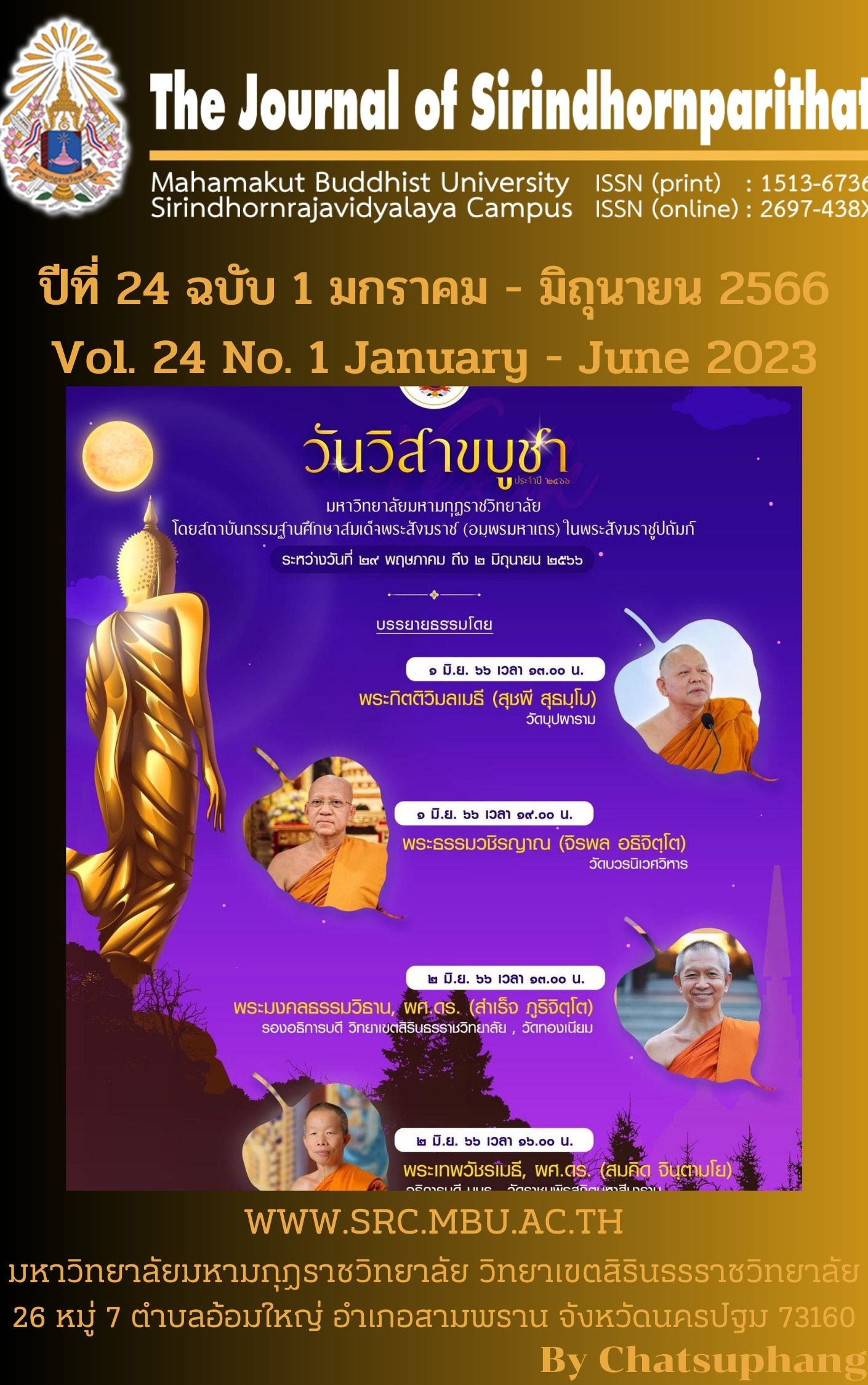The Audio-Lingual Method Used in Pronouncing The /r/ in English of Bachelor' S Degree Thai Students Faculty of Education Mahachulalongkornrajavidyalaya University
Keywords:
The Audio-Lingual Method, Learning Pronouncing the /r/, To develop the Ability, English Pronunciation, Bachelor’s Degree Thai StudentsAbstract
The objectives of this research work are as follows:1) To study the problems of pronouncing the /r/ in English of Bachelor’s Degree Thai Students in 3rd and 4th year majoring in English Language Teaching of Faculty of Education, Mahachulalongkornraja-vidyalaya University. 2) To analyse the effectiveness of the Audio-Lingual Method used for learning pronouncing the /r/ in English, and 3) To apply the Audio-Lingual Method and develop the ability in pronouncing the /r/ in English of Bachelor’s Degree Thai Students in 3rd and 4th year majoring in English Language Teaching of Faculty of Education, Mahachulalongkornrajavidyalaya University with the Audio-Lingual Method.
The results of the research work according to the hypothesis of the research work are as follows: 1. The results of pre-test and post-test of the Frequency of Reading 50 English Wordlists of Oral Mimicry of Sounds in Pronouncing the /r/ in English that were done by 25 students of the sampling group can be identified that the frequency of pronouncing the /r/ in English of post-test is higher than that of pre-test for t = -39.099 and df = 24 significantly in statistics at .000 which is less than .05. It can be concluded that the results of pre-test are different from those of post-test significantly in statistics. 2. Most of the sampling group felt very satisfied with learning pronouncing the /r/ in English with a researcher. They were knowledgeable a lot about the /r/ sound, places of articulation and manners of articulation and know how to pronounce it correctly, clearly and fluently. Moreover, they have got a self-confidence after learning and practicing pronouncing the /r/ in English. 3. Most of the sampling group realized that the Audio-Lingual Method can help develop an ability in pronouncing the /r/ in English well. Moreover, it is an important factor for effective learning.
The sampling group feels satisfied, agree and have got a self-confidence in learning pronouncing the /r/ in English with this method. 3. Most of the sampling group realized that Listening and Repeating, and Spelling and Pronouncing are the first step in learning pronouncing the /r/ in English. They can develop an ability in pronouncing the /r/ in English well. Moreover, the sampling group can pronounce the /r/ in English correctly, clearly and fluently.
References
Alghazo, A. M. (2017). The effectiveness of audio-lingual method in teaching pronunciation: A study of EFL students in Saudi Arabia. International Journal of English Linguistics, 7(3), 1-11. doi: 10.5539/ijel.v7n3p1.
Piyawadee Abhichartbutr. (2003). “The reason why Thai people have got a problem with /r/ and /l/ in English”. Damrong Journal. 2(3).
Beebe, LM. (1980). “Sociolinguistics Variation and Style Shifting in Second Language”. In G. Loup, and SH, Weiberger. (eds.). Interlanguage Phonology, Cambridge: Newbury house Publisher.
Cagri Tugrul Mart. (2013). “The Audio-Lingual Method: An Easy way of Achieving Speech”, International Journal of Academic Research in Business and Social Sciences, 3(12).
Chuensuwimol, B. (1993). “Variations of the /r/ in Thai and English Languages along Social Variants of Bangkok Thai Language Speakers”. Bangkok: A Dissertation of Doctor of Linguistics, Graduate School: Chulalongkorn University.
Demirezen, M. (2013). “The Status of /r/ in the Pronunciation of Turkish Ph.D Candidates and Its Rehabilitation by Computer and Auditary Programes”, Journal of Language and Linguistics Studies, 9(29): 69-74.
Dian Ayu Lestari and Agung Laksono. (2019). The Effectiveness of Audio-Lingual Method in Pronouncing /r/ Sound among Indonesian EFL Learners. Studies in English Language and Education, 6(2) : 266-277.
Janya Naksompong et al. (2007). “A Study of Thai Phonological Features that cause Pronunciation Problems for Thai People”, A Thesis of Master’s Degree in Teaching English as a Foreign Language, Language Institute, Graduate School: Thammasat University.
LEO Network. “Learn English”. [Online], Resource: https://www.learnenglish.de/ pronunciation/theletterr.html [June 9, 2021].
Lestari, D. A., & Laksono, A. (2020). The Effectiveness of Audio-Lingual Method in Pronouncing /r/ Sound among Indonesian EFL Learners. Journal of Language Teaching and Research, 11(3), 195-201. doi:10.17507/jltr.1103.01
Maedeh Alemi and Ehteramsadat Tavakoli, (2016). “Audio Lingual Method”, 3rd International Conference on Applied Research in Language Studies, 1(1) : 1-5.
Pinthip Thuaycharoen. (2004). “Overview of the Study of Phonetics and Linguistics”, Bangkok: Thammasat University Press.
Purinan Hirunyupakorn, Dr. Kanita Chaimano et al. (2014). “Variation of /r/ in Syllable-Initial Consonant Clusters of English Words According to Style and English-Language Experience of English Major Students”, Khon Khaen University Graduate Research Conference GRC.
Takashima, S. (2016). Effectiveness of Audio-Lingual Method on English Pronunciation for Japanese University Students. English Language Teaching, 9(7) : 211-219. doi: 10.5539/elt.v9n7p211

Downloads
Published
Issue
Section
License
Copyright (c) 2023 Mahamakut Buddhist University

This work is licensed under a Creative Commons Attribution-NonCommercial-NoDerivatives 4.0 International License.
บทความที่ได้รับการตีพิมพ์เป็นลิขสิทธิ์ของ มหาวิทยาลัยมหามกุฏราชวิทยาลัย วิทยาเขตสิรินธรราชวิทยาลัย
ข้อความที่ปรากฏในบทความแต่ละเรื่องในวารสารวิชาการเล่มนี้เป็นความคิดเห็นส่วนตัวของผู้เขียนแต่ละท่านไม่เกี่ยวข้องกับหาวิทยาลัยมหามกุฏราชวิทยาลัย วิทยาเขตสิรินธรราชวิทยาลัย และคณาจารย์ท่านอื่นๆในมหาวิทยาลัยฯ แต่อย่างใด ความรับผิดชอบองค์ประกอบทั้งหมดของบทความแต่ละเรื่องเป็นของผู้เขียนแต่ละท่าน หากมีความผิดพลาดใดๆ ผู้เขียนแต่ละท่านจะรับผิดชอบบทความของตนเองแต่ผู้เดียว



